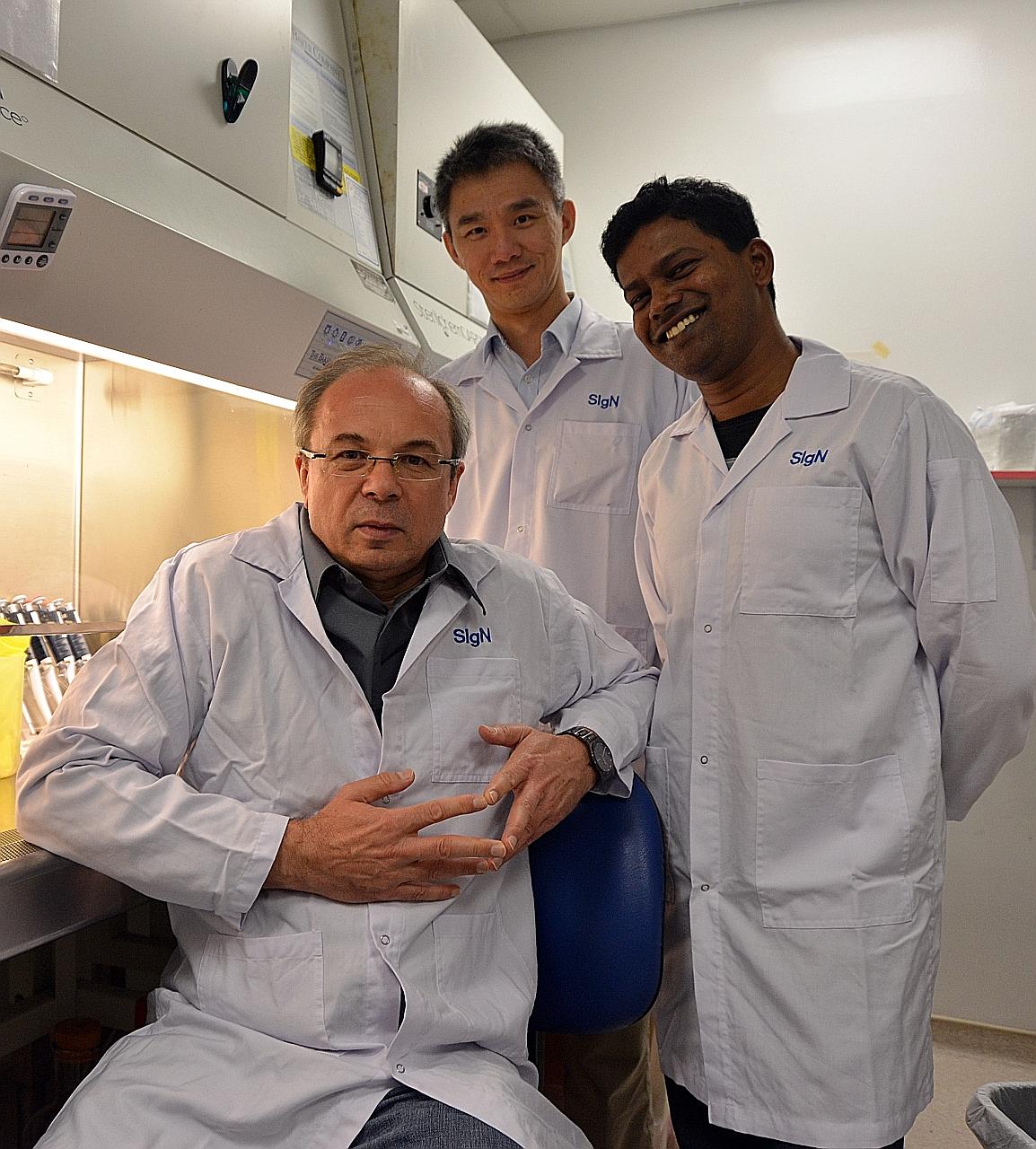Help at hand for those who have nasal allergy
Study shows afflictions can be curbed when body switches off a particular immune cell
Sign up now: Get ST's newsletters delivered to your inbox

The team from A*Star's Singapore Immunology Network who are involved in the study on basophil anergy include (from left) Dr Olaf Rotzschke, Dr Kia Joo Puan and Dr Andiappan.
PHOTO: AZIZ HUSSIN FOR THE STRAITS TIMES
About one in three Singaporeans suffers from early-morning sniffles, a runny or blocked nose, and other nasal allergy symptoms, according to a study in 2013.
But a new study indicates that help is at hand. It shows that such afflictions can be kept at bay when the body switches off a specific type of immune cell.
In doing so, it builds up a natural barrier against such attacks, scientists of the Agency for Science, Technology and Research (A*Star) and National University of Singapore (NUS) have found.
The cells are called basophils, which circulate in the blood and function primarily to initiate and maintain the immune response against allergens. They do it by activating certain key regulatory molecules to rid the body of the allergens.
But the scientists found an odd outcome when the basophils do not operate, a state they termed "basophil anergy". This naturally reduced basophil response to irritants like dust mites results in a lower risk of acquiring allergic rhinitis - whose symptoms include an inflamed nose, itchiness, sneezing and a runny or blocked nose.
"Basically these cells are circulating but they cannot see the allergen's pathways," said Dr Anand Kumar Andiappan, a senior research scientist at A*Star's Singapore Immunology Network (SIgN), who was part of the study team.
"Hence, there is no allergic response," he added.
The findings were published online in international journal Allergy last month.
The discovery was made by the team in a study involving 476 Chinese Singaporeans who were initially asked to complete a questionnaire on their nasal allergies.
Then they were given a skin-prick test, which checks for immediate allergic reactions to a range of substances. They provided blood samples as well.
Close to one in 10 of them has basophil anergy.
The question the team is now looking to solve is whether the basophil state can be therapeutically modified in people prone to allergies, by exposing them to small dosages of allergens. The aim would be to condition the immune system to recognise the allergens but not respond extremely to them in the form of an allergic reaction.
"We have a hypothesis, formed through our laboratory studies, that supplying low dosages of allergens may lead to increased basophil anergy," said Dr Andiappan.
He added that once it is understood how basophil anergy occurs, molecules that control the mechanism can be targeted with, for instance, drugs to activate or shut them down.
And to get additional insight into what causes allergies, the team will collaborate with clinicians, academics and public health experts to conduct a study on about 500 adults with asthma , as well as a paediatric allergy study of 500 children.
The researchers will also look for biomarkers - molecules or genes linked to the condition - which could potentially be targeted through new therapies to treat asthma and other nasal allergies.
Dr Olaf Rotzschke, a principal investigator at SIgN who led the study, said allergies are often underestimated as a problem as they do not kill and people learn to live with them. He said the situation in Singapore is relatively simple as a previous study by the SIgN team had found the main cause of allergic asthma to be the house dust mite. "We need to do two things: Find a medical cure and raise awareness."
Research Professor Wang De Yun from the NUS Yong Loo Lin School of Medicine said most treatments for nasal allergies address the symptoms and do not deal with the cause.
"This basophil anergy phenomenon could provide some clues as to how we can move from just treating symptoms temporarily to potentially targeting the cause of the allergies," he said.
• Dr Andiappan will give a talk on what causes allergies and whether they are becoming more common at the one- north Festival on Aug 5. To register, visit: http://www.onenorthfestival.sg/


